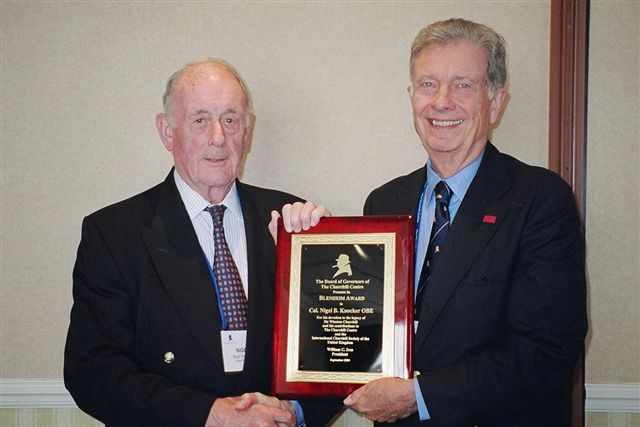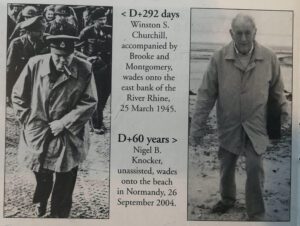
Nigel Bedingfield Knocker OBE 1930-2023: He Answered the Call
Dear Nigel
The friend of many Churchillians, Col. Nigel Knocker died 21 February at his home in Seend, Wiltshire, with his beloved wife Angela at his side. In 1997 The Churchill Centre UK was in need of a chairman, and a kind Providence sent us Nigel. He served the UK branch through 2008, skillfully and with humour. We loved him dearly, and are poorer for his passing. “A man never dies as long as he is remembered.”
From the Seend village magazine
Born in 1930, Nigel was the son of an air commodore and former officer in the Indian Army. Educated at Oakham School, he entered National Service in January 1949. He served with 14/20 Kings Hussars before being commissioned into the Life Guards. In 1951 he transferred to the infantry, joining the Royal Sussex Regiment on the Suez Canal in 1951. His early career included a tour as an ADC before returning to the Regiment as Adjutant in Korea, Germany and Gibraltar. Subsequent tours included Australia, Northern Ireland and the Staff College, Camberley.
Nigel was most proud of his long association with Oman. He took command of the Desert Regiment of the Sultan’s Armed Forces (SAF) at the height of the Dhofar War in May 1971. He received the Sultan’s Distinguished Service Medal for his skill in command on Operation Simba. Nigel was appointed an Officer in the Most Excellent Order of the British Empire (OBE) in 1974.
Promoted to Colonel, he returned to Oman as Defence Attaché from 1977 to 1980, and later served with the SAF Chief of Defence Staff from 1982 to 1985. He chaired the Sultan of Oman’s Armed Forces Association from 1997 and the Anglo-Omani Society. His profound contribution to UK-Oman relations was recognized with the Order of Oman in 2018.
Nigel’s first marriage to Cartiona Mcleod in 1958 was blessed with two children, Jonathan and Fiona. Catriona died in 1979 and in 1981 he married Angela Willoughby. After retirement, Nigel and Angela moved to Seend in 1986. There he became the Emergency Planning Officer of Wiltshire County Council.
Mentioned in our despatches
Mentioning young Churchill in despatches, his commander wrote: “He made himself useful at a critical moment.” Nigel arrived at one of those periodic crises of the Old Guard. The UK Branch had unexpectedly lost its chairman, and was at a loss over whom to send for. Celia Sandys had the answer: a retired Army colonel. We expected a severe taskmaster, perhaps even an officious mandarin. We found instead a warm-hearted collaborator and devotee of the Churchill saga. Unlike some, his support never wavered—a “foul weather friend,” as Churchill said.

Nigel paid his first call on us in New Hampshire in 1998, joining us for a sailing cruise on Lake Sunapee. Given the helm of a strange boat in a stiff breeze, he pranged the pier. He never ceased apologizing, even years later, for a minor bump that would have been worse if I’d had the tiller! A few years later we visited Angela and Nigel in their beautiful Wiltshire village. We walked leafy lanes and green meadows with his Springer spaniels and conjured Churchill events to come.
Nigel’s greatest triumph was the 12th Churchill Tour, “Normandy to Berlin,” in 2004. With the same attention to detail that endeared him to the Omani Armed Forces, Nigel laid out the operation. He and 40 partners including Lady Soames waded the beaches of Normandy and followed the route of the Allied armies to Potsdam. There they visited the site of the Potsdam Conference, welcomed at the “pink house” where Churchill stayed. Grand memories.
“One mark of a great man,” Churchill said…
“is the power of making lasting impressions upon people he meets.” Nigel Knocker had that power—accompanied by a wit and dry humour that endeared him to us all. I remember our debating what to do with a certain board member who had become a burden. “You have to admit, Nigel, she’s in London, connected by a line in your organisation chart.” “Perhaps,” quipped the Colonel, “we could just make that a dotted line….”
Those who didn’t work closely with him and saw only the successful results may have missed the qualities of sound opinion and judgement he brought to our deliberations. But qualities which lay behind we closely understood. Churchill’s words on his best friend, F.E. Smith, Lord Birkenhead, will always remind me of Nigel Knocker. He’d blanche to hear this applied to him, but he has it coming:
His close friends, and certainly I, acclaimed him for what he was…a gay, brilliant, loyal, lovable being…. We met and talked on innumerable occasions; never did I separate from him without having learnt something, and enjoyed myself besides. F.E was always great fun; but more than that he had a massive common sense and a sagacious comprehension which made his counsel invaluable…. He had all the canine virtues in a remarkable degree—courage, fidelity, vigilance, love of the chase…. Man of the world, man of affairs, adept at the written or spoken word, book-lover—there were few topics in which he was not interested, and whatever attracted him, he could expound and embellish.
The hearts of his friends
And Nigel too deserves Churchill’s final accolade: “Some men when they die after busy, toilsome, successful lives leave a great stock of scrip and securities, of acres or factories or the goodwill of large undertakings.” He “banked his treasure in the hearts of his friends, and they will cherish his memory till their time is come.”







2 thoughts on “Nigel Bedingfield Knocker OBE 1930-2023: He Answered the Call”
From Angela Knocker:
Thank you so much, I feel very humbled and proud, you have written such a touching tribute and I have sent it on to the rest of family. So many happy times and I know his involvement with the Churchill Centre meant a lot to him, a very special time in his life. He felt very honoured to be asked to be chairman, thank you again for taking the trouble to write it.
Your article on Nigel Knocker brought back great memories of our times together with our Churchill Centre friends. Nigel’s tour terminating in Berlin was most memorable.
Comments are closed.